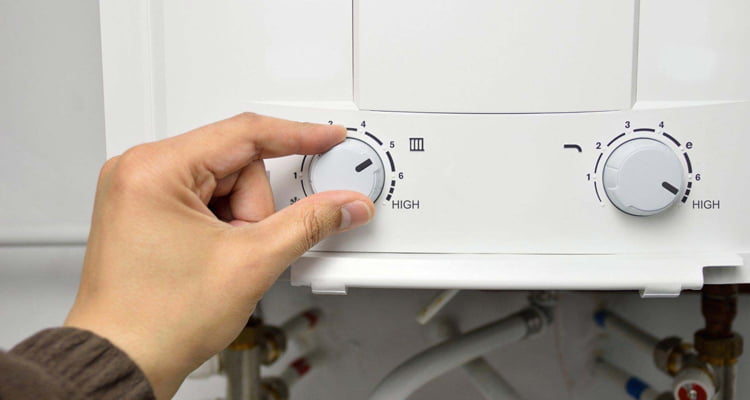
Hot Water Heater Challenges in Cold Weather: What Every Homeowner Should Know
In the thick of winter, nothing beats a hot and comforting shower. But what if your trusty hot water heater suddenly decides to give up? That’s a situation nobody wants to face. Hot water tank issues can be more than just a minor inconvenience; they can disrupt your daily routine and even cause potential damage to your heating system.
That’s where
reliable HVAC experts come into play. In this blog, we will discuss common issues that hot water heaters face in cold weather and provide you with practical solutions to ensure your hot water keeps flowing, even on the coldest days.
What Causes Hot Water Heater Troubles?
Hot water heaters may encounter various issues when the temperature drops. To tackle these problems, you need to be aware of the following factors.
Insufficient Hot Water Supply
One of the most frustrating issues you may encounter in cold weather is a reduction in your hot water supply. Turning on the faucet only to be greeted with lukewarm water can be disheartening.
During the winter, the cold water entering your hot water tank is much colder than in warmer months. As the cold water flows into the tank, the heater has to work harder to raise the temperature to the desired level. This increased workload can sometimes result in insufficient hot water.
Frozen Pipes And Tank
In frigid weather, the water inside your
hot water tank and the pipes that carry it can freeze. When water freezes, it expands, which can lead to numerous complications.
Frozen pipes and tanks not only reduce hot water availability but can also cause extensive damage to your plumbing system. The expansion of frozen water can burst pipes and rupture the tank, leading to costly repairs.
Heating Element Woes
Hot water tanks rely on heating elements to warm the water. However, in cold weather, these elements can become less efficient.
Cold temperatures cause the heating element to take longer to reach the desired temperature. This prolonged heating cycle increases energy consumption and decreases hot water availability.
Thermostat Troubles
Your water heater’s thermostat plays a crucial role in maintaining your water temperature. In icy weather, the thermostat may struggle to maintain the desired temperature setting, leading to inadequate heating.
The thermostat might constantly trigger the heating element to work, resulting in high energy bills without significantly improving the hot water supply. It’s essential to address these thermostat issues promptly.
Preventive Measures
Now that we understand the potential causes of water heater troubles in cold weather let’s explore preventive measures to ensure your hot water keeps flowing, even in cold conditions.
Also Read: Common Winter HVAC Problems And How To Prevent Them
To prevent these issues, you can take the following steps:
- Insulate Your Pipes And Tank: Proper insulation can prevent your pipes and hot water tank from freezing. Use pipe insulation sleeves to protect your pipes from the extreme cold, and consider adding a water heater blanket to your tank to reduce heat loss.
- Set The Right Temperature: Adjust your hot water tank’s temperature setting to ensure it’s warm enough for comfort but not excessively high, which can lead to energy wastage. The ideal temperature setting is around 120°F (49°C).
- Regular Maintenance: Schedule routine maintenance checks to ensure your water heater is in optimal condition. Annual check-ups by a professional can help identify and resolve potential issues before they become major problems.
Maintenance Tips For Hot Water Tanks
Maintaining your water heater is crucial to ensure it runs smoothly throughout the year. Regular maintenance can help you avoid unexpected cold-weather breakdowns and extend the lifespan of your hot water heater.
Here are some essential maintenance tips:
- Check The Pressure Valve: Regularly test the pressure relief valve to prevent pressure buildup, which can damage the tank.
- Drain The Tank: Periodically draining the tank helps remove sediment and maintains efficiency. This is especially important in areas with hard water.
- Inspect For Leaks: Regularly inspect your tank and pipes for any signs of leakage. Identifying and addressing leaks promptly can prevent extensive water damage.
- Replace Anode Rod: An anode rod is a sacrificial component that prevents corrosion inside the tank. If it’s worn out, replace it to extend the tank’s life.
- Schedule Professional Checkups: While DIY maintenance is essential, remember to schedule professional maintenance at least once a year. Professional plumbers can detect and resolve complex issues and ensure your hot water heater operates efficiently.
By following these maintenance tips and taking proactive measures, you can keep your hot water heater in top condition and enjoy uninterrupted hot water even in the coldest weather.
About Us
Welcome to
Pro West Heating & Air Conditioning, your trusted partner in all things HVAC. Our company, headquartered in Vancouver, is dedicated to providing you with top-notch services in heating and air conditioning. Our team of skilled technicians is adept at addressing issues with furnaces, boilers, and heat pumps.
If you require heating or air conditioning services,
reach out to us.
